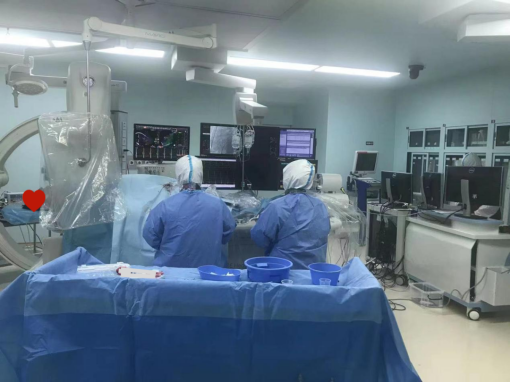- News
Precision Ablation Calmed Down the "raging heartbeat" of A 125-kilogram Boy with Incessant Ventricular Tachycardia at Cardiovascular Center of Shanghai General Hospital
Link of original article:
https://mp.weixin.qq.com/s/qzKvpDyXQoDxFavpRW1tvQ
Recently, the cardiovascular center of Shanghai General Hospital performed emergency catheter ablation procedure for a 125-kg patient with "incessant ventricular tachycardia". Dr Genqing Zhou, deputy chief physician of the cardiovascular center, overcame a series of difficulties, such as untouchability of femoral artery, poor cooperation of patients during the procedure, and difficulty in completing accurate mapping. With rich experience and superb technology, the team sniped culprit of the "violent heart” and restored normal heart rhythm for this patient. Then the patient was discharged. During a follow-up on 9th July, ECG and Electrocardiography were normal, indicating the full recovery of this patient.

At the end of June, Xiao Li (pseudonym), a 22-year-old male patient came to emergency department of a hospital with persistent palpitations and chest tightness. ECG showed supraventricular tachycardia with heartbeat of 190-200 beats per minute. Xiao Li received some medications and electric cardioversion in the ER. But the tachycardia seems unstoppable. The doctors performed emergency electrophysiological examination for this patient. During the procedure, it was found that Xiao Li was not suffering from "supraventricular tachycardia" but a more dangerous disease, ventricular tachycardia, which means that the patient may exhibit hypotension shock, malignant arrhythmia, acute heart failure and other dread conditions at any time.
The hospital urgently contacted our Cardiovascular Center for an emergency online consultation. Dr. Zhou, the deputy chief physician participating the consultation, made a clear diagnosis of ventricular tachycardia for the patient and a decision that the ablation performed for the patient is under urgent requirement. Considering the difficulty and risk of the operation, under the coordination of Prof. Shaowen Liu, director of our Cardiovascular Center, and Dr. Genqing Zhou, the medical department and cardiac catheterization laboratory of Shanghai General Hospital opened a "green channel" for referral of the patient for emergency procedure.
Soon, Xiao Li was transferred to the emergency room at Shanghai General Hospital for emergency radiofrequency ablation. According to the results of cardiac electrophysiological examination during the former procedure, the origin of the ventricular tachycardia was probably located at left ventricle. Normally, the catheter for ablation is delivered into the left ventricle through femoral artery. However, Xiao Li is with severe obesity, weighing more than 125 kgs, the femoral artery is not palpable. On the other hand, conventional postoperative hemostasis by compression could not ensure the artery hemostatic, and may cause some risking complications such as pseudoaneurysm, hematoma and severe blood loss. Ultimately, the Dr Zhou decided to perform the procedure from the femoral vein route with atrial septum puncture to deliver the catheter into the left ventricle.
Catheter ablation is performed with a three-dimensional electrophysiological mapping system, which needs doctors position the catheter accurately to 1 mm. With rich clinical experience, the team overcame obstacles such as obesity of the patient and irritability of the patient during the procedure. Finally, the origin of tachycardia located in the "his-purkinje system" of the left ventricle was confirmed. However, further precise mapping could not be achieved. Dr Zhou's team could only perform empirical ablation. After several times of attempts, Xiao Li's ventricular tachycardia was successfully terminated and normal heartbeat was gradually restored. After 30 minutes of observation and inducing in various ways, ventricular tachycardia did not appear again. Two days later, Xiao Li was discharged. On 9th July, Xiao Li came to Shanghai General Hospital for follow-up. It showed that his ECG and echocardiography were completely normal.
According to Professor Liu Shaowen, director of the cardiovascular clinical medical center of Shanghai General Hospital, critical and severe tachycardia is not uncommon. Most patients can be relieved by emergency drug treatment and cardioversion, but there are still some cases that emergency catheter ablation is needed to control the “raging heart”, such as ventricular electrical storm, atrial fibrillation with Wolff-Parkinson-White (WPW) syndrome, incessant tachycardia with cardiogenic shock, etc. The team for cardiac arrhythmia in our Cardiovascular Center routinely carries out 24-hour emergency catheter ablation. With complete equipment and rich experience in clinical treatment, the team successfully cures a large number of critical patients suffered from cardiac arrhythmia every year. The clinical effect of our treatment is pretty good.
Correspondent: Genqing Zhou, Shaowen Liu, Cardiovascular Center
Editor: Shishi Cai, Publicity department
